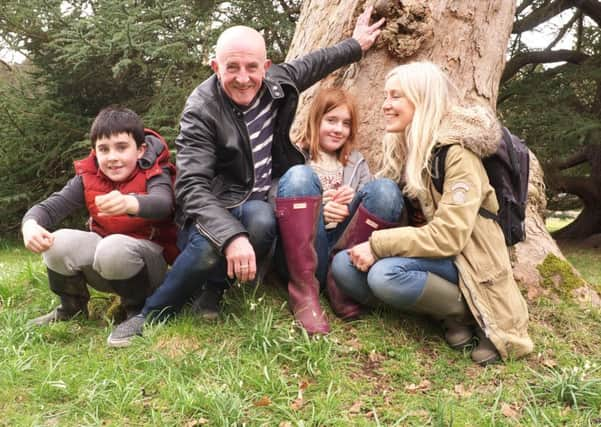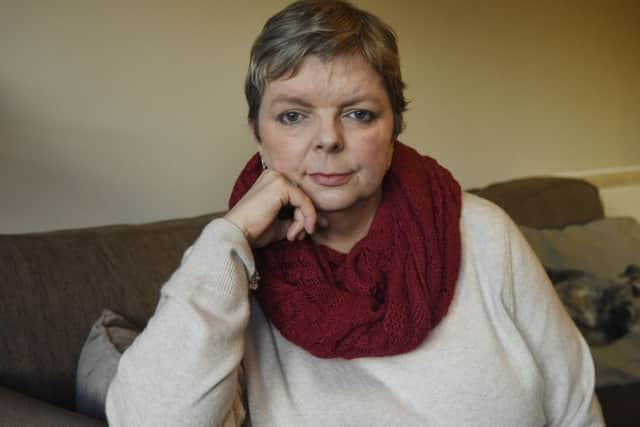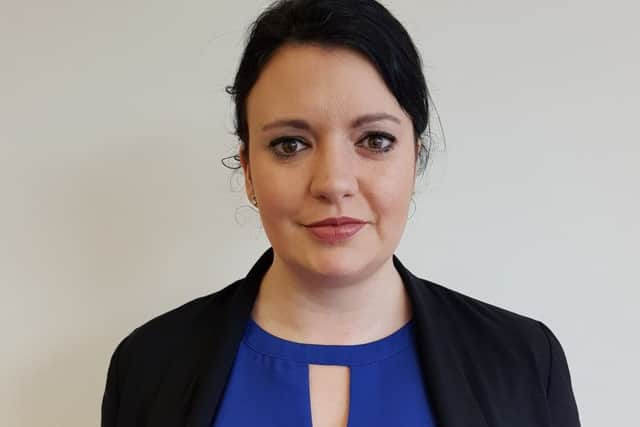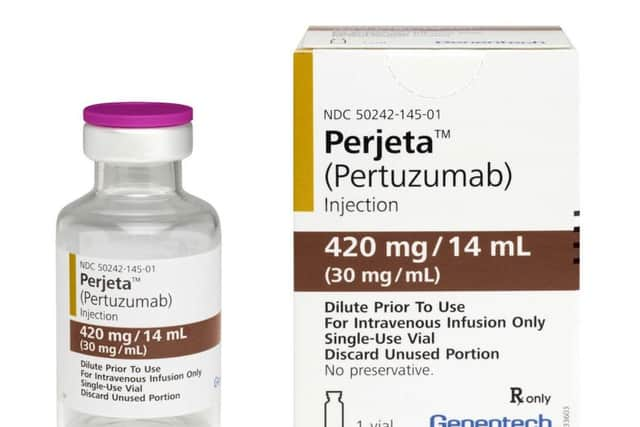Insight: How the NHS decides what drugs it will and won't pay for


Roz Paterson is in London, trying to carve out a few days of quiet time with her husband Malcolm and her two children, Thea, 13, and David, 10. The 52-year-old from Beauly is suffering from B-cell lymphoma cancer which has proved unresponsive to chemotherapy.
Now, she is pinning her hopes on Car-T cell therapy – a cutting edge treatment that uses the immune system to kill cancer cells. But Car-T therapy is hugely expensive and is not yet available on the NHS in Scotland. In England, the National Institute for Health and Clinical Excellence (NICE) approved the drug involved – Kymriah – for use in adults in December; but the institute’s Scottish equivalent, the Scottish Medicines Consortium (SMC), is not due to publish its advice until 11 March. And that will be too late for Roz, who has been told she might only have weeks to live.
Advertisement
Hide AdAdvertisement
Hide AdInstead, she has launched a fundraising campaign in the hopes of starting the therapy at Boston’s Massachusetts General Hospital in February; for her to do this, her whole family would have to move to Boston for a couple of months; she has been told she needs $700,000 or half a million pounds in total.


Since Roz’s race against time became public last weekend, she has been swept along on a tidal wave of goodwill. A Twitter account and Facebook page have been set up and events, big and small, organised. There will be a Raising for Roz event at Dingwall Auction Mart on 2 February, and on 24 February, bands including the Primevals (of which Malcolm was a founding member) will play a gig at Glasgow University’s Queen Margaret Union.
The support is welcome. But Car-T therapy causes severe side-effects in three-quarters of patients and – though when it works, it works very well – it has a 30-40 per cent success rate. Uncertain of what the future holds, the family have decided to escape for a few days before Roz, a former journalist, flies out to Boston for an initial consultation later this week. “We wanted to take the children out of the spotlight and spend some time together. We just don’t know what lies ahead,” she says.
Hundreds of miles away, at her home in Edinburgh, Jen Hardy, 51, who has incurable breast cancer, is reflecting on happier news. Earlier in the week, the SMC decided to approve the use of Perjeta – a drug that can extend the lives of women suffering from HER2-positive breast cancer by 16 months. This was the fourth time the manufacturer Roche had made a submission for Perjeta; the first three times its applications were rejected on the grounds of cost.
This victory has come too late for Jen. Perjeta has to be taken near the beginning of treatment. But when she was diagnosed back in October 2017, it was not available on the NHS in Scotland, and she could not afford to take out a loan for the £50,000 it would have cost her to get the treatment privately.


Like Car-T therapy, the treatment was available in England. For a while she considered moving south, but decided it was more important to remain close to her daughters Erin, 21, and Carys, 19.
“When I was first told Perjeta – a drug that could improve the quality of my life and buy me extra time – existed, but I couldn’t have it, I was very angry. It was almost worse than if the drug did not exist,” says Jen. “When you have been told people with HER2-positive breast cancer live an average of five years, an extra 16 months is a long time.
“I wanted those months, not only so I could experience the big occasions like graduations and weddings, but also just for the day-to-day stuff. I want to wake up in the morning. I want to live.”
Advertisement
Hide AdAdvertisement
Hide AdJen suffers from fatigue and is not currently able to do her job as a timetabler for Heriot-Watt University. Often she is too tired to do housework or walk the dog, yet she decided to devote what little energy she has to campaigning so other women wouldn’t have to suffer the same injustice.


She knew about previous successful campaigns, such as the one for Kadcyla, an end-of-life drug for HER2-positive breast cancer patients. So she teamed up with Breast Cancer Now Scotland and together they pushed the issue up the news agenda.
“I understand how difficult it is to take these decisions,” says Jen. “The company has invested a lot of money in developing the drug. A chap from Roche told me: ‘It costs £100,000 to submit an application so it is a big decision for us to try again.’ I also understand it is difficult for the SMC. What a horrendous job to have to say: ‘We will not give you this medicine you need.’
“But the ethics are problematic. If a company is sitting on the most valuable thing – more time with your family – but you can’t access it on the NHS, there’s something wrong there.”
These two stories underline the complexity of making decisions on the provision of life-saving or life-prolonging drugs on the NHS when demands are limitless, but resources finite. Who would envy the SMC the task of weighing an individual life against the benefits several hundred thousand pounds spent differently could bring 100 other patients?
Every decision the committee comes to is a balancing act: of evidence on a drug’s effectiveness, its cost, the number of people it will help and who might lose out as a result of it being funded.
The pan-UK situation is further complicated by devolution. The decisions on which drugs to approve are made by separate national bodies and – though Cancer Research UK says decisions are mostly aligned – there are still some inconsistencies in judgments and timescales. Thus, both Perjeta and Car-T were available in England before Scotland. At the same time Daratumumab – an immunotherapy drug used to treat myeloma – was available on the NHS in Scotland three months before it was approved by NICE.
“NHS Scotland spends over £1.67bn a year on prescriptions, and one in five adults in Scotland is prescribed five or more medicines. So when it comes to accepting new medicines for routine use we need to be confident that those medicines are both clinically and cost-effective,” says SMC chairman Dr Alan MacDonald.
Advertisement
Hide AdAdvertisement
Hide Ad“Our committee members, most of whom treat patients regularly, take decisions based on the detailed evidence presented to us by pharmaceutical companies, patient groups and clinicians.
“The company submissions often run to hundreds of pages for just one medicine. We look at how well the medicine works, which patients would benefit from it, whether it is as good or better than medicines the NHS already uses to treat the particular condition, and whether it is likely to be good value for money.
“Some decisions are straightforward, particularly when there is a clear-cut case for a medicine’s cost-effectiveness. However, the case is very often not clear-cut, and one of the biggest challenges is how to deal with uncertainty.”
This uncertainty, says MacDonald, is intensified by the increasing tendency of the European Medicines Agency and the Medicines and Healthcare Products Regulatory Agency to license medicines based on relatively limited clinical trial data.
“Our decisions are finely balanced judgments, taking into account a medicine’s cost- effectiveness, measured by the QALY [quality adjusted life year] and a number of other factors. Although both length of life and quality of life are important, there are no rules of thumb for what constitutes a clinically meaningful benefit in terms of additional months of life or a treatment’s success rate.”
Some drugs, then, are rejected because their effectiveness is in contention. But with others – including Perjeta – the concerns are chiefly about the cost. Drug companies may then agree confidential discounts known as Patient Access Schemes. These are dealt with by the Patient Access Scheme Assessment Group (PASAG), which operates separately from the SMC.
For commercial reasons, negotiations are carried out behind closed doors, so it is difficult to find out how these things play out. But it is clear that there is sometimes brinkmanship between the NHS and the companies.
In order to come to a more informed decision on end-of-life and highly specialist medicines, the SMC has, since 2014, introduced new procedures which allow clinicians and patients to contribute through the Patient and Clinical Engagement Group (PACE).
Advertisement
Hide AdAdvertisement
Hide AdWhen Breast Cancer Now Scotland was running its campaign on Perjeta, one of its goals was to persuade Roche that it was worth paying out £100,000 for another shot. “We are not sure Roche would have resubmitted if it hadn’t been for our campaign,” says policy manager Ashleigh Simpson. “We got women like Jen, who have been affected by this particular form of secondary breast cancer, to talk about how not being able to access Perjeta on the NHS in Scotland had impacted on them.
“We launched a petition, which 12,203 people signed, and we also called on the SMC, the Scottish Government and Roche to work together to see if they could make the drug cost a little less.”
Simpson says 244 women a year are expected to benefit from the drug with the figure rising to 983 after five years. With new drugs constantly in development, the Perjeta campaign is unlikely to be the last. Indeed, certain trends in medical research mean new drugs are becoming increasingly expensive and funding decisions even more complex.
“The drive towards more specialised treatments, stratifying patients into smaller groups is very exciting from a research and patient perspective, but it means your patient groups are smaller, which in turn means drugs cost more. In the context of financial constraint this can be difficult,” says Rose Gray, policy manager for Cancer Research UK.
Gray cites Car-T therapy as a good example of this, pointing out that projections suggested that, were it approved for paediatric use, it would benefit just one child a year in Scotland. “That is an extreme example of something that is incredibly specialised, but it’s where things are heading,” she says.
Some years back, it was suggested orphan or ultra-orphan drugs – which benefit only a tiny number of people – were rarely approved by the SMC. Instead patients were obtaining them on the NHS through Individual Patient Requests, which may be granted in exceptional circumstances. Unfortunately, as Gray points out, this relies on the clinicians involved being up to date with all the latest developments.
After two government reviews gave the SMC clear steers to increase access to orphan and ultra-orphan medicines, it developed new processes which afford its committee greater flexibility. “As a result, acceptances have increased from 48 per cent between November 2011 and October 2013 to 75 per cent between May 2014 and March 2016,” says MacDonald.
The second of these reviews – the Montgomery Review – also recommended NHS National Services Scotland should be able to play a greater role in negotiating the price of a drug with the pharmaceutical companies before their products come before the SMC. This would allow all parties to express their expectations over cost in advance and should mean fewer submissions being rejected first-time round.
Advertisement
Hide AdAdvertisement
Hide AdFinally, the review recommended Scotland look at introducing a system similar to England’s where drugs at first receive conditional approval and become available only through the Cancer Drugs Fund. The effectiveness of these drugs is closely monitored and – if they prove less effective than advertised – they are either withdrawn or the price is renegotiated.
The SMC has now implemented this policy for those medicines which address unmet need (ie there are no other treatments available) and have been granted a conditional licence by the European Medicines Agency.
In these instances, the SMC can accept the drug for use on an interim basis until the company has the additional clinical data required by the EMA, at which point it can make a resubmission to the SMC.
The SMC is also trying to build up the infrastructure for the collection of clinical outcome data in NHS Scotland, which might allow it to extend the interim decision option to other medicines.
Finally, it is introducing a new process that will involve ultra-orphan medicines being made available for use initially for a period of three years while further data on clinical effectiveness is gathered. SMC will then reassess the medicine and make a final decision on whether it should be available for routine use on the NHS.
Cancer Research UK believes the only way for the NHS to cope with the spiralling cost of new treatments is to find some mechanism to introduce more flexibility on pricing.
To this end, it is exploring the potential of outcomes-based pricing where the cost of a drug is linked to its effectiveness on individual patients in the real world.
At its simplest, this might mean bonuses for drugs that outperform expectations and penalties for those which under-perform. But it could also involve paying more for a particular drug when it proves beneficial to a particular patient or group of patients, and less when it does not.
Advertisement
Hide AdAdvertisement
Hide Ad“There are lots of different models to explore,” says Gray. “But the critical point is that all of this relies on really good data infrastructure because you need to be really confident that the answer you are getting is the right one.”
Cancer Research UK has carried out an initial research project with a report due in a few weeks. “It involved lots of literature reviews, including examples of where outcome-based pricing has been trialled internationally,” says Gray. “The main aim though was to understand the outcomes that matter to patients, so there was lots of engagement through surveys and workshops.
“In the next phase, we plan to explore how feasible these outcomes would be in a real-world setting and, if that goes to plan, the ambition is to trial outcome-based pricing in Greater Manchester.
“The broader benefit of this approach is that you are building a health service around really accurate, explicit measures of the value actual patients get from the treatment and ultimately that should be beneficial to everyone.”
Of course, none of this is much good to Roz or Jen, who have now lost out on the chance of the treatment they require on the NHS.
Roz’s friends and supporters have already raised £250,000 – half the sum she needs for the trip. Later this week, all going well, she will head to Boston for her first consultation. While out there, she will have to negotiate how much money she has to pay up-front.
“It can be difficult for the public to understand that not all new medicines can be funded through the NHS, but clearly patient groups will campaign for those they represent,” says MacDonald. “I would say our members feel they are doing their best to make fair and impartial decisions on all medicines and these decisions are based on evidence, not what has been in the media or patient group campaigns.”
And yet campaigns sometimes deliver. Last week – two days after the announcement on Perjeta – Jen received a photograph on her mobile phone. It had been sent by another woman with HER2-positive breast cancer, and showed her receiving the drug for the first time.
Advertisement
Hide AdAdvertisement
Hide Ad“People sometimes ask me: ‘Is it like a double-edged sword?’ and I say: ‘Not really,’ because I am past that stage now of thinking ‘I should have had this. It’s an injustice to me.’
“When I saw the Perjeta going into this woman’s body, I was like: ‘Oh my goodness.’ It really personalised it for me. I knew I was doing this for other women because I didn’t want anyone else to be in my position, but there she was actually receiving it.
“There was no resentment. I was absolutely thrilled for her.”